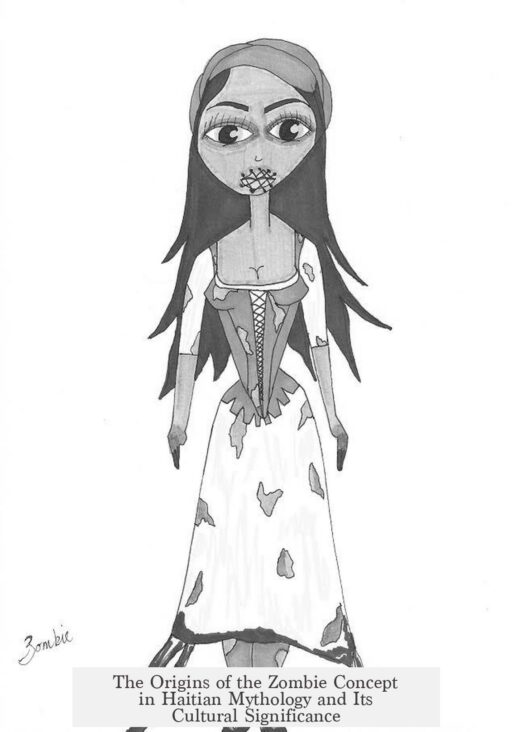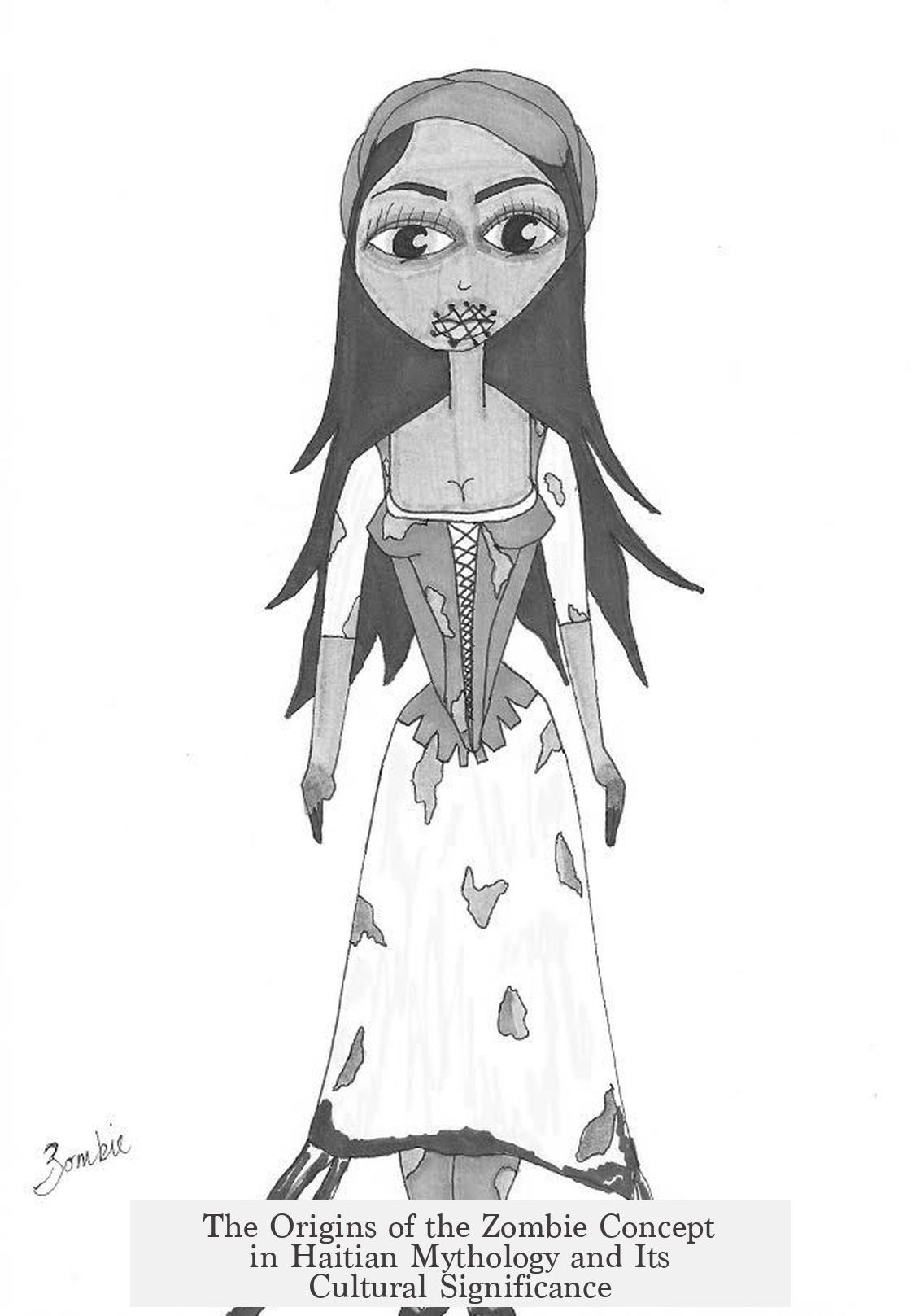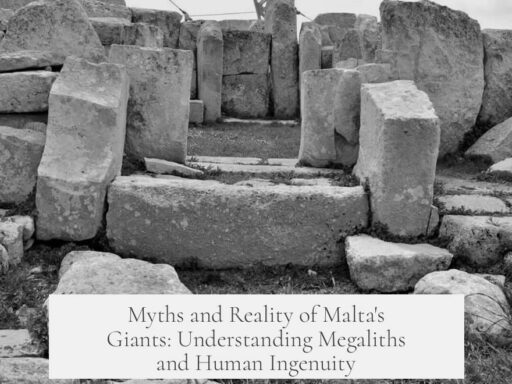The concept of the zombie in Haitian mythology originates as a complex cultural and historical figure rooted in African traditions and profoundly shaped by the experience of slavery and colonialism in Haiti. This idea emerged as both a metaphysical and political symbol that reflects the traumatic history of forced labor and social dispossession under slavery.
The Haitian zombie is far from the Hollywood flesh-eating monster. Its origins lie in African spiritual beliefs about the living dead, adapted to the Haitian reality during and after colonization. Haitian scholars such as Maximilien Laroche argue the zombie serves as a metaphor for chattel slavery. It embodies the condition of slaves—deprived of freedom, reduced to labor for a master, stripped of personal will.
The zombie concept merges religious and economic meanings. It is not solely a supernatural figure but also a symbol expressing the lived social conditions under colonial domination. Vodou religion played a key role by integrating and altering African beliefs about spirits and souls to fit the Haitian political context. Thus, the zombie reflects both defensive and offensive reactions to oppression, adapting metaphysical notions into the social realities of Haiti’s enslaved population.
Interpretations of the zombie as a pure metaphor for slavery are debated. Some recent scholarship criticizes this view by pointing out that portraying enslaved people as soulless, passive creatures risks erasing their agency and resistance. Conversely, the zombie has also been read as a cautionary emblem, linking anti-colonial rebellion with terror and control, showing its flexible symbolic use in political narratives.
Ethnographers studying Haitian zombies reveal wide heterogeneity in local beliefs. Zombies appear in two main types: flesh zombies and spirit zombies.
- Flesh Zombies: These are dead bodies revived by sorcerers called bòcò using secret concoctions, including extracts from specific plants and puffer fish poison. Victims enter a catatonic state with minimal signs of life. Post-burial, the bòcò retrieves and cures them partially, leaving them mentally impaired and enslaved to the sorcerer’s will. They perform various tasks, from farming to menial work.
- Spirit Zombies: These lost souls exist independently of bodies. They can be trapped in jars or caves by their masters and utilized for different purposes. Such spirits may assist with benign tasks like homework or be weapons for harmful acts like murder. Sometimes they transform into animals or products for sale.
This diversity shows the Haitian zombie concept functions as a multifunctional tool in folk magic. It is far more complex than the simplistic “zombie-as-slave” metaphor suggests. The key shared belief is soul theft, a sorcerer’s ability to capture one or more of a person’s souls—the Haitian folklore holds humans have multiple souls—and bind them or their bodies for magical uses.
Haitian zombie myths draw extensively from African roots. Linguistic connections link the word “zombi” with various West and Central African terms related to ghosts or revenants. Ethnographic parallels arise in African cultures where sorcerers wield power to enslave spirits or bodies through magical means.
One notable example comes from the Duala people of coastal Cameroon, historically involved in the slave trade. Their traditions include sorcerers who magically enslaved humans as obedient, mindless servants. Such historical realities intertwine with spiritual beliefs, influencing Haitian zombie narratives.
The Haitian experience of slavery, combined with African beliefs and local political dynamics, shaped the unique zombie concept. It reflects a cultural memory of alienation—loss of self, freedom, and agency under brutal economic and social control.
The Haitian zombie also exists beyond myth alone. Traditional Vodou practitioners, bòcò, reportedly create zombies through actual pharmacological means. Using potent toxins from plants and fish, these poisons induce a deathlike state that fools observers. Without modern medical devices, confirming death and revival is difficult. This scientific aspect grounds the zombie in experiential reality, not simply legend.
After burial, the bòcò returns the victim to consciousness, but the individual suffers permanent psychological damage, becoming compliant and diminished. These zombies do not exhibit violence or cannibalism popularized in Western fiction but remain laborers under mystical servitude.
This reality intersects the spiritual and material worlds, underpinning the Haitian zombie not only as folklore but as a lived social phenomenon. It represents a fusion of African cultural concepts, historical trauma from slavery, and local religious practices, demonstrating the resilience and adaptability of belief systems confronting oppression.
| Aspect | Details |
|---|---|
| Origin | African spiritual beliefs adapted to Haitian slavery context |
| Symbolism | Metaphor for slavery, loss of agency, political control |
| Types | Flesh zombies (revived corpses), Spirit zombies (captured souls) |
| Practitioners | Bòcò (sorcerers crafting zombies with poison) |
| Functions | Labor, punishment, magical tasks (help or harm) |
| African Connection | Linguistic roots and cultural similarities in West and Central Africa |
| Scientific Basis | Use of neurotoxins to induce zombie-like state, confirmed cases in rural Haiti |
- The Haitian zombie concept is deeply tied to historical experiences of slavery and colonial oppression.
- It combines African spiritual beliefs with sociopolitical realities in Haiti.
- Zombie narratives cover a broad range of beliefs, including flesh and spirit zombies.
- Bòcò sorcerers create zombies using poisons, inducing a deathlike trance.
- The Haitian zombie is not a violent monster but a symbol of domination and alienation.
- Cultural and ethnographic studies uncover the complex, multifaceted nature of the zombie.
- Scientific observations support the phenomenon’s physical reality in Haitian contexts.
How Did the Concept of the Zombie Originate in Haitian Mythology?

The Haitian zombie is far from the brain-eating monster Hollywood loves to portray. Instead, it originates as a complex, deeply rooted cultural figure intertwined with history, religion, and social realities. The concept of the zombie in Haitian mythology reflects a blend of African spiritual traditions, the horrors of slavery, and local Vodoun adaptations.
So, what exactly is a zombie in the Haitian context? And how did this idea develop? Let’s unravel this fascinating story.
The Zombie as a Metaphor for Slavery
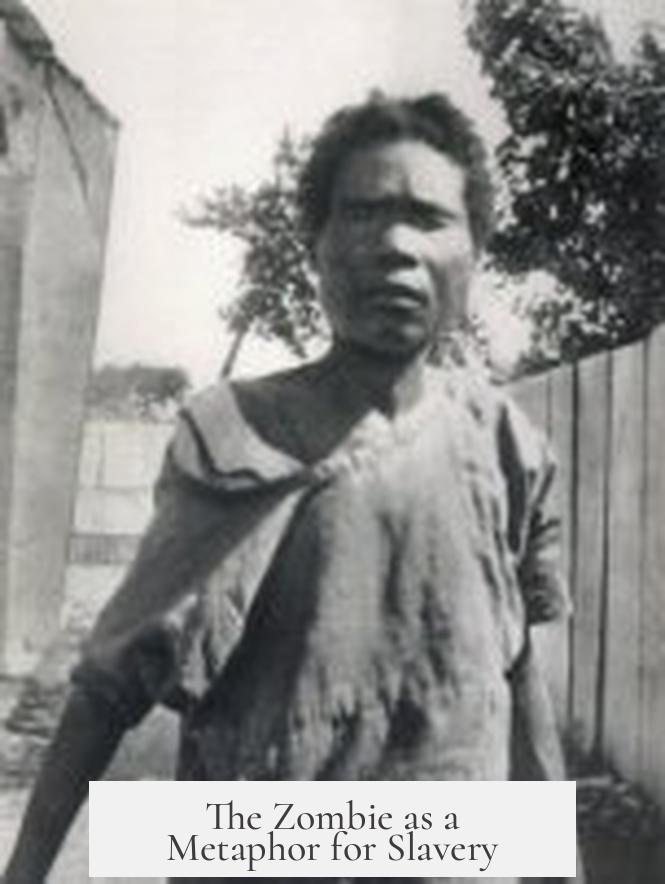
One of the most compelling academic perspectives on Haitian zombies comes from Maximilien Laroche, a Haitian-born scholar writing in 1975. He proposed that the Haitian zombie arose as a metaphor for the experience of chattel slavery. This isn’t just about dead folks walking around. It’s a symbol of someone dispossessed—forced into servitude, stripped of autonomy, reduced to a tool for another’s gain.
Laroche points out that while African cultures had existing beliefs about the living dead, the Haitian zombie took on a new shape. It became a representation of the social, economic, and political reality slaves endured on the island. Colonization and forced labor effectively created beings who were alive but lacked freedom and will.
Interestingly, the zombie serves dual purposes within Vodoun beliefs—both religious and economic. It’s not simply a creepy ghost story but a tool to explain and cope with the trauma of slavery and colonialism.
Could zombies be seen as cautionary figures? According to some, yes. The terrors of zombification might have been used historically as a warning to discourage rebellion among slaves, equating resistance to a loss of soul and death. In this framework, the Haitian Revolution becomes a paradoxical symbol—both a heroic fight for freedom and a terrifying example of what happens when social order is challenged.
But watch out! Some scholars, like Hoermann in 2016, warn against oversimplifying zombies merely as soulless slaves. Real enslaved people retained agency and spirit despite oppression. Zombies as a metaphor can be useful politically and artistically but don’t capture the full human experience.
The Ethnographic Complexity: Zombies Are More Than One Thing
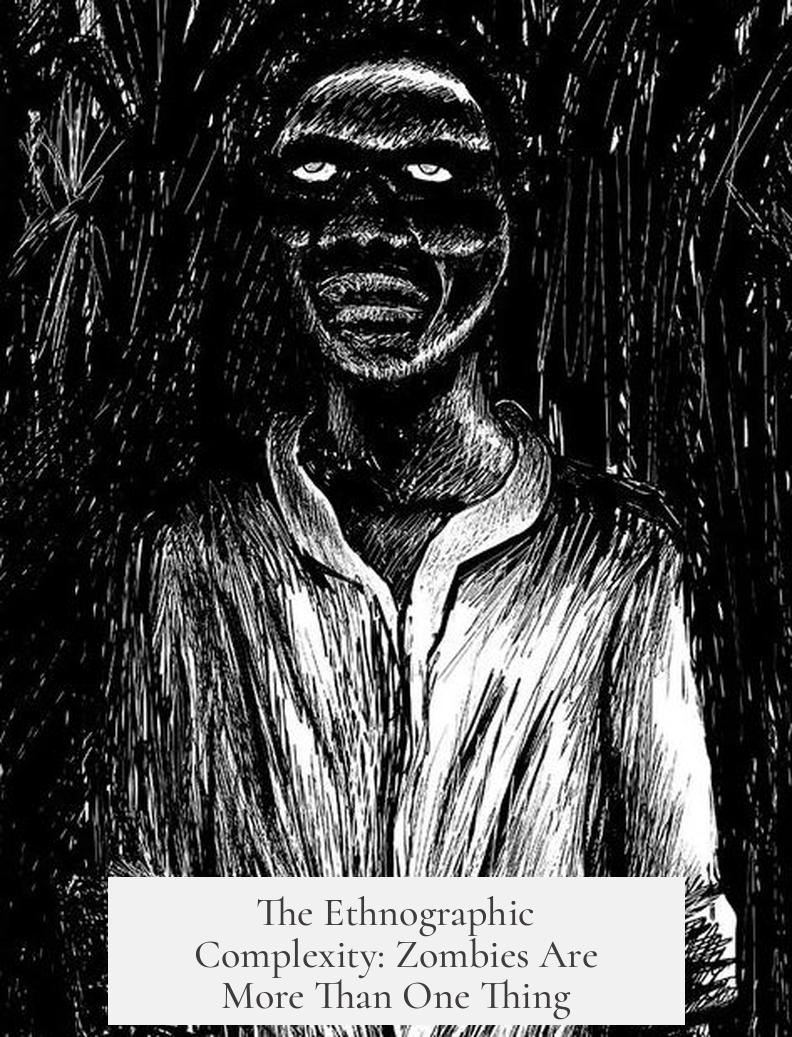
Jump ahead to the 1990s when researchers Ackermann and Gauthier dive into the Haitian zombie more ethnographically. They reveal something surprising: the Haitian zombie concept is amazingly diverse. It’s not a monolithic figure but a “Swiss Army knife” of supernatural roles.
What do they mean? In Haitian folklore, zombies fall into two main categories:
- Flesh zombies: These are the classic “walking dead” created by sorcerers (known locally as bòcò). They come with a range of abilities and serve diverse roles—from working fields to crunching numbers. Some are even used as punishments.
- Spirit zombies: Invisible or trapped in jars, these souls can be rented or sold. They might help a student with homework or be unleashed for darker tasks, like assassination or shape-shifting into animals. Yes, Haitian zombies get busy!
This diversity shows that zombies are more than just slave metaphors. The core belief revolves around a sorcerer capturing a person’s soul (or one of multiple souls). This soul theft grants the sorcerer power over flesh and spirit alike. This blend of mythology creates an imaginative and varied zombie lore.
Deep African Roots in Zombie Lore
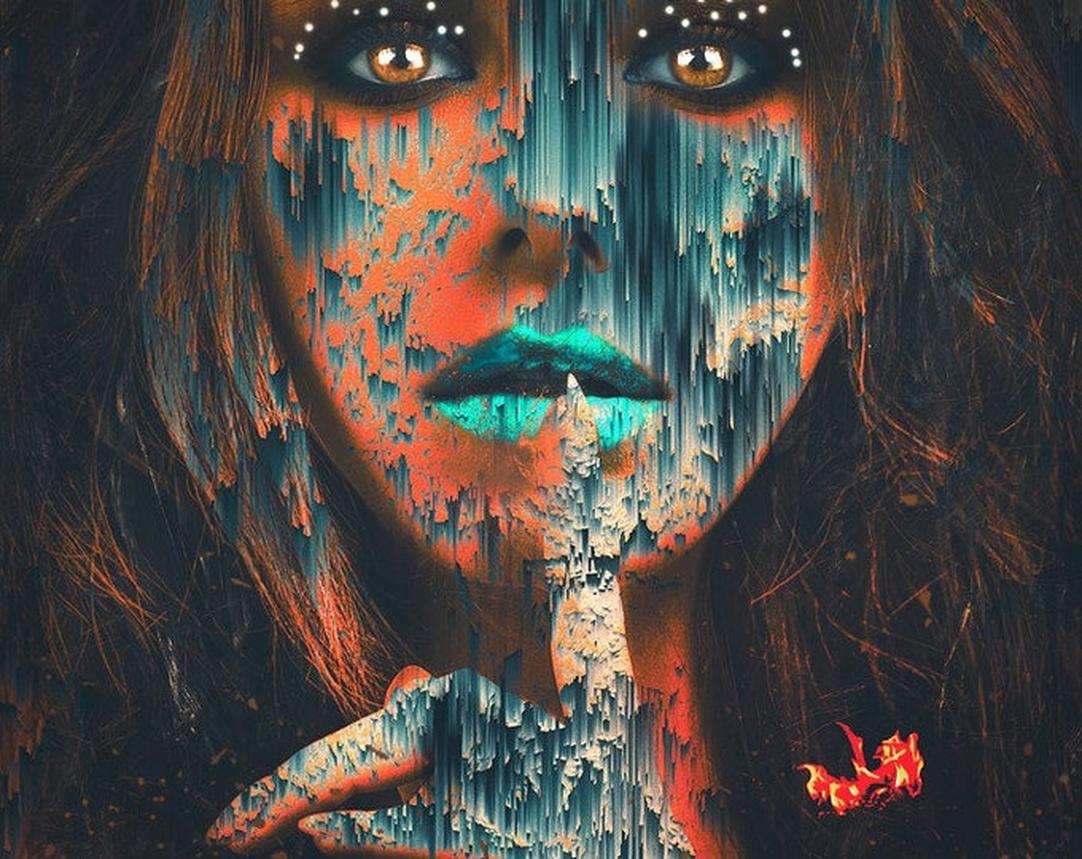
But where did these ideas initially come from? Not surprisingly, they trace back to African beliefs. The very word zombi sounds close to several terms across West and Central African languages—words like fumbi and mvumbi that relate to ghosts, corpses, and spirits.
Moreover, certain elements in Haitian zombie stories have clear African parallels:
- Use of salt to revive or awaken a zombie
- The nasal voice often attributed to undead figures
- The notion of enslavement via magic
One fascinating example lies with the Duala people in Cameroon. From the 18th to early 20th centuries, the Duala were involved in slave trading. Sorcerers there reportedly captured souls to enslave individuals magically before these people were sold or put to work. Could this have traveled with enslaved Africans to Haiti, adapting and transforming with time?
Reality Behind the Myth: The Bòcò, the Pufferfish, and Zombie Creation
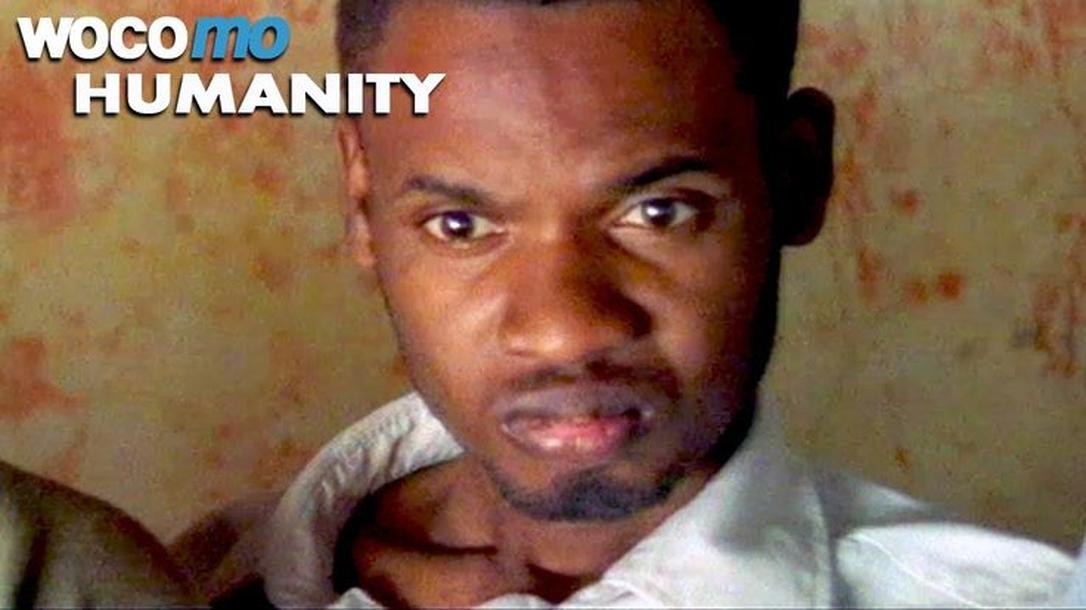
Enough folklore talk—let’s get to the nitty-gritty. Zombies in Haitian belief aren’t just stories; some claim they are real phenomena with physical evidence. The bòcò, a Vodoun priest or sorcerer, creates zombies using secret poisons.
The main poison is extracted from the pufferfish, a notoriously toxic creature. This concoction induces a deep, catatonic state that mimics death; the victim appears lifeless with minimal bodily signs. After burial, the bòcò retrieves the victim’s body and administers an antidote, effectively reviving them but with mental impairments—making them willing servants.
Far from the ravenous monsters in movies, these zombies are docile and obedient, deprived of their former autonomy. Scientists and anthropologists have debated these accounts, but locals insist that such zombification is very much a real—and terrifying—possibility.
Putting It All Together
The Haitian zombie embodies complex layers—it’s a cultural symbol, a spiritual figure, and a social metaphor wrapped into one. Its origins are woven from African traditions, brutally reshaped by slavery and colonial oppression. The idea evolves further within the Haitian Vodoun context to explain and confront harsh realities.
Is the zombie simply a monster? No. It’s a figure loaded with meaning about control, freedom, suffering, and resilience.
So next time you see a Hollywood zombie mindlessly wandering for brains, remember the Haitian zombie’s story is far richer and more thought-provoking. It challenges us to think about history, power, and what it means to be fully alive or utterly controlled.
Questions to Ponder
- How do cultural beliefs adapt under trauma and oppression?
- Are zombies in other cultures interpreted similarly, or is the Haitian model unique?
- What does the persistence of zombie folklore tell us about collective memory and identity in Haiti?
Recommendations for Further Exploration
- Explore Maximilien Laroche’s writings for a deep dive into the political symbolism of zombies
- Read Ackermann and Gauthier’s ethnographic research to understand the diversity of Haitian zombies
- Investigate African oral traditions regarding spirits and dead-servants for historical roots
- Study Vodoun’s role in Haitian history and its blend of spiritual and social functions
Whether you view zombies as creatures of terror or cultural mirrors, their Haitian origins reveal a fascinating interplay between myth and reality, showing just how storytelling adapts to survive—and make sense of—the hardest parts of human history.
What is the origin of the Haitian zombie concept?
The Haitian zombie concept originated as an adaptation of African beliefs about the living dead. It was transformed in Haiti to reflect the social and political reality of slavery and colonial oppression.
How does the Haitian zombie relate to slavery?
The Haitian zombie symbolizes the slave who is deprived of will and forced to serve a master. It is both a social and economic metaphor connected to the trauma of slavery and loss of freedom.
Are Haitian zombies rooted only in religion?
No. Haitian zombies have dual significance, religious and political. Vodoun adapts African beliefs to Haitian conditions to serve political aims, both defensive and offensive.
How diverse is the concept of the zombie in Haitian folklore?
Haitian zombies vary widely. Some are soulless bodies enslaved by sorcerers, others are bodiless spirits used for many purposes, from harmless to harmful. The concept is flexible and complex.
What African influences shaped the Haitian zombie?
The word “zombi” resembles terms from West and Central Africa related to ghosts and spirits. Common elements like enslavement and magical traits come from African folklore, linking Haitian zombies to African origins.
